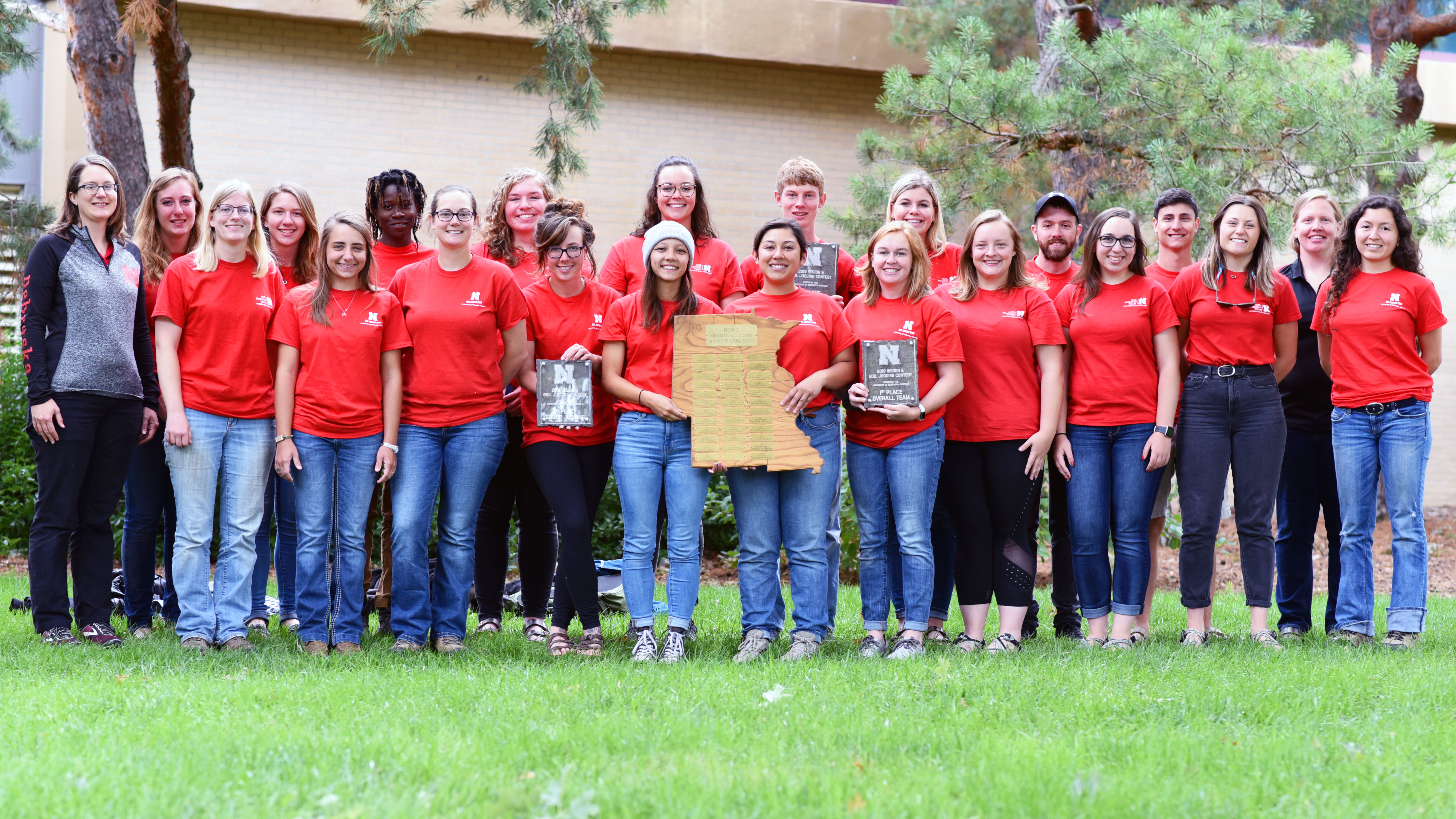
In a demonstration of their grit, the University of Nebraska-Lincoln Soil Judging Team for the second time in three years swept the Region 5 competition Oct. 3 in Grand Island, Nebraska, beating out six other teams to earn first place finishes across the board.
The team — 17 students from the School of Natural Resources and the Department of Agronomy and Horticulture — earned first place in the group judging contest, as well as the overall competition, where only four of 16 individual scores count toward a total group score.
And Bryan Petersen, a junior applied climate science major, earned first place in the individual competition, competing against more than 60 others, including his own teammates and those from Iowa State University, Kansas State University, University of Minnesota, South Dakota State University and University of Missouri, and University of Nebraska-Omaha. Nicole Strand, a senior fisheries and wildlife major, also placed in the top 10 in the individual competition.
Their placement puts the team in a top position for the 2020 National Soil Judging Contest set for spring in Ohio.
“I believe our success is a testament to our coaches' hard work,” Petersen said after their return from competition Oct. 4. “Trying to organize and get 17 individuals to work as a team is very difficult, but our coaches managed to get the team to work efficiently and effectively.”
Co-coach Judith Turk, pedologist with the Conservation and Survey Division at SNR, acknowledged the challenge, but said with planning and practice, a large team can actually be a big advantage.
“You can make use of each individual’s aptitudes and then the team becomes stronger by working together,” she said. The tactic takes fine-tuning, though, so over the course of the three-day practice sessions near Grand Island, the team continued to move members into positions most suited to their strengths.
By competition day, they were ready to identify, evaluate, classify and describe five soil profiles in previously unseen soil pits and also rate the area for land use. How their descriptions compared to professional-level descriptions determined their score. Nebraska’s ended nearly 80 points ahead of the next closest team, University of Missouri, and more than 100 points ahead of University of Minnesota, which took third place overall.
“There really is not a better week in the semester than soil judging week,” Strand said. “Most people don't understand why we love to spend a week getting rained on in 40 degree weather just to be covered in mud and bug bites, but the teamwork, friendship, and experience gained is irreplaceable.”
“(Soil judging) is a fantastic experience,” Petersen said. “Through soil judging, I have learned how soils are formed and connected to the landscape, and the team also has given me some of my best friends and some lifelong memories.”
Over the course of the week, Strand said each of the team members grew, with newer ones taking charge and speaking their minds after being guided by those returning to the competition pits.
“That's something we have to thank our coaches for, because they do an amazing job creating this team dynamic that has clearly paid off the last three years,” she said.
This year’s team members include:
- Ema Muslic, a junior environmental restoration major;
- Kara Philips, senior agricultural education major;
- Meryl Sahouet, senior agronomy major;
- Rebekah Simmons, senior environmental restoration major;
- Katie Boden, senior environmental restoration major;
- Brian Bostock, senior environmental restoration major;
- Damaris Cano, junior environmental studies major;
- Katherine Gerdes, freshman intercampus UNO student;
- Cadence Hernandez, senior environmental restoration major;
- Maria Mika, senior environmental restoration major;
- Petersen, senior applied climate major;
- Taylor Riecken, a senior environmental restoration major;
- Strand, senior fisheries and wildlife major and Grassland Ecology & Management major;
- Clare Wilton, junior elementary education and special education major;
- Katie Pace, senior environmental restoration major;
- Luke Walkenhorst, senior environmental restoration major; and
- Amy Yanagida, senior environmental restoration major.
Co-coaches were Turk and Rebecca Young, assistant professor of practice in Agronomy, who also served as competition host with Nebraska State Soil Scientist Neil Dominy. Lindsey Anderson, and Alyssa Kuhn, both of Agronomy, and Samantha Teten, of Biological Systems Engineering, served as graduate assistant coaches.
When others had to turn down hosting the Region V Soil Judging Contest this year, Nebraska stepped up despite hosting the regional contest just three years ago.
“Normally the contest wouldn’t return to our state so quickly,” Turk said. “Becky and Neil stepped in and agreed to take our turn hosting early. They had to pick out field sites and organize all of the contest logistics on relatively short notice, and they did an amazing job at it.”
Young said, “It was great to have the opportunity to show students and coaches from around the region the diversity of soils that do exist in central Nebraska, which most people just think of as flat and homogenous. Everyone worked hard throughout the week, through the heat, rain, wind, and cold, and left with a great appreciation for our soils and landscapes. That’s the best award as a contest host.”
Funding success
The team has had continued competition success over the past several years, continually placing well at the regional and national levels. But getting to competition sites isn’t free. Throughout the year, the students host multiple fundraisers to help cover travel expenses however they can. The UNL Soil Judging Team Excellence Fund, through the University of Nebraska Foundation, covers the rest. Tax-deductible donations can be made to that fund by visiting nufoundation.org and searching for “UNL Soil Judging Team Excellence Fund.”